2023届高考英语复习从句讲练课件(共12张PPT)
文档属性
| 名称 | 2023届高考英语复习从句讲练课件(共12张PPT) | 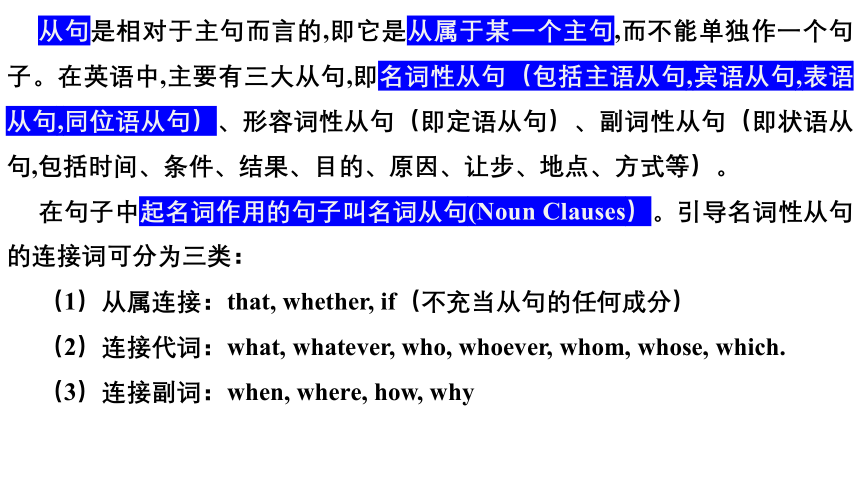 | |
| 格式 | pptx | ||
| 文件大小 | 148.7KB | ||
| 资源类型 | 教案 | ||
| 版本资源 | 通用版 | ||
| 科目 | 英语 | ||
| 更新时间 | 2023-03-23 17:42:10 | ||
图片预览

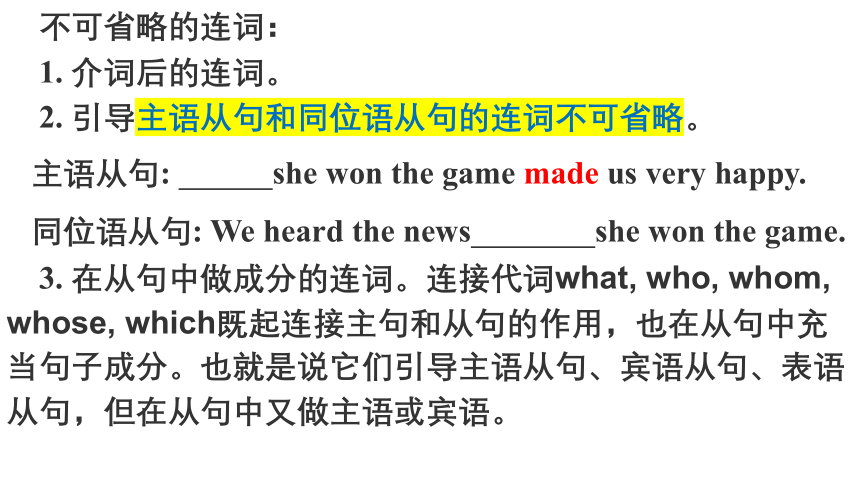
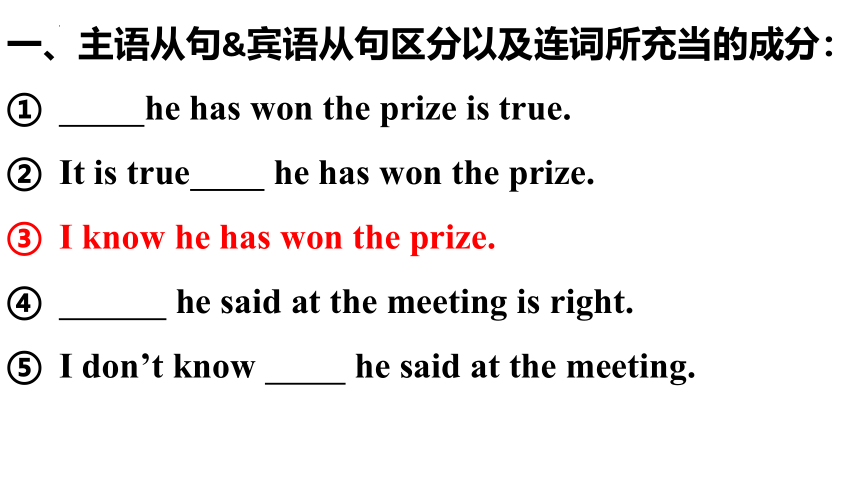
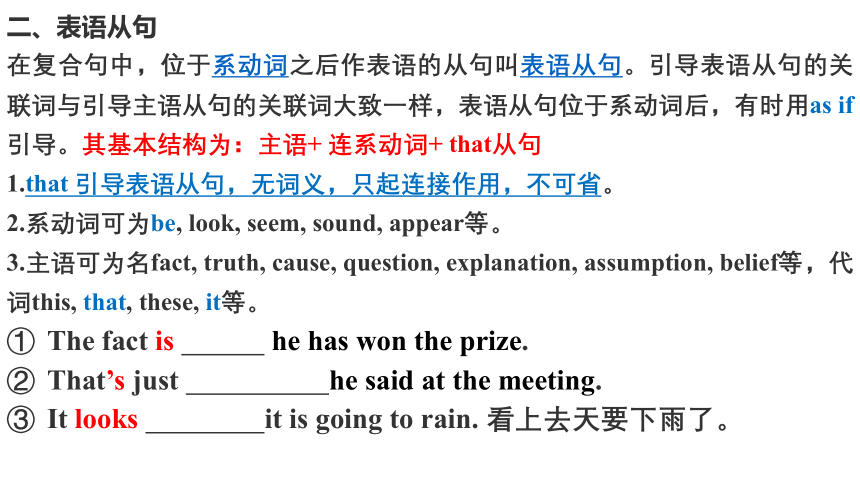
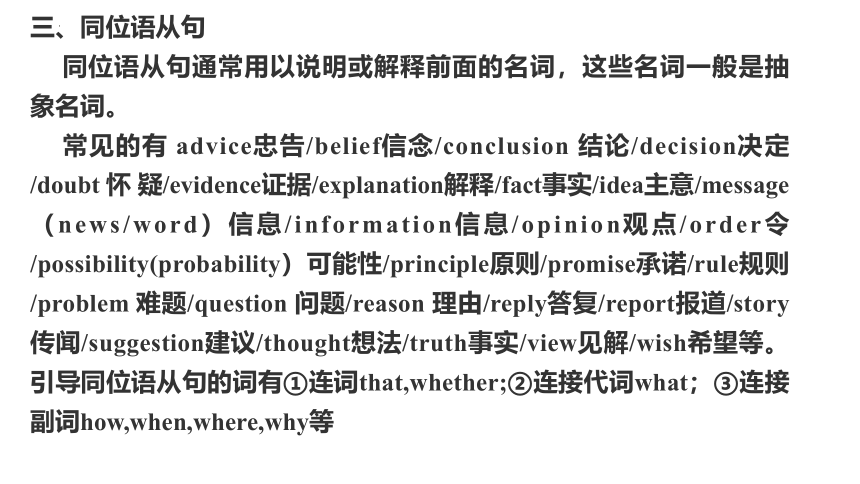
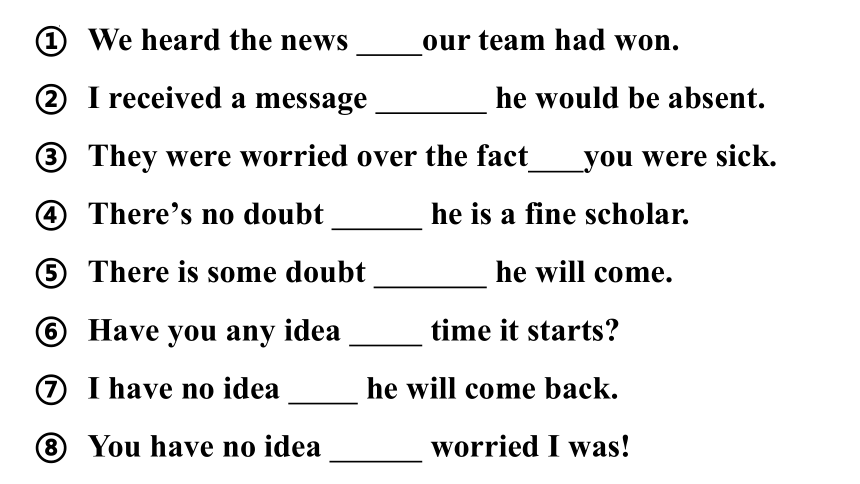
文档简介
(共12张PPT)
从句是相对于主句而言的,即它是从属于某一个主句,而不能单独作一个句子。在英语中,主要有三大从句,即名词性从句(包括主语从句,宾语从句,表语从句,同位语从句)、形容词性从句(即定语从句)、副词性从句(即状语从句,包括时间、条件、结果、目的、原因、让步、地点、方式等)。
在句子中起名词作用的句子叫名词从句(Noun Clauses)。引导名词性从句的连接词可分为三类:
(1)从属连接:that, whether, if(不充当从句的任何成分)
(2)连接代词:what, whatever, who, whoever, whom, whose, which.
(3)连接副词:when, where, how, why
不可省略的连词:
1. 介词后的连词。
2. 引导主语从句和同位语从句的连词不可省略。
主语从句: she won the game made us very happy.
同位语从句: We heard the news she won the game.
3. 在从句中做成分的连词。连接代词what, who, whom, whose, which既起连接主句和从句的作用,也在从句中充当句子成分。也就是说它们引导主语从句、宾语从句、表语从句,但在从句中又做主语或宾语。
、主语从句&宾语从句区分以及连词所充当的成分:
he has won the prize is true.
It is true he has won the prize.
I know he has won the prize.
he said at the meeting is right.
I don’t know he said at the meeting.
二、表语从句
在复合句中,位于系动词之后作表语的从句叫表语从句。引导表语从句的关联词与引导主语从句的关联词大致一样,表语从句位于系动词后,有时用as if引导。其基本结构为:主语+ 连系动词+ that从句
1.that 引导表语从句,无词义,只起连接作用,不可省。
2.系动词可为be, look, seem, sound, appear等。
3.主语可为名fact, truth, cause, question, explanation, assumption, belief等,代词this, that, these, it等。
The fact is he has won the prize.
That’s just he said at the meeting.
It looks it is going to rain. 看上去天要下雨了。
三、同位语从句
同位语从句通常用以说明或解释前面的名词,这些名词一般是抽象名词。
常见的有 advice忠告/belief信念/conclusion 结论/decision决定/doubt 怀 疑/evidence证据/explanation解释/fact事实/idea主意/message(news/word)信息/information信息/opinion观点/order令/possibility(probability)可能性/principle原则/promise承诺/rule规则/problem 难题/question 问题/reason 理由/reply答复/report报道/story传闻/suggestion建议/thought想法/truth事实/view见解/wish希望等。引导同位语从句的词有①连词that,whether;②连接代词what;③连接副词how,when,where,why等
We heard the news our team had won.
I received a message he would be absent.
They were worried over the fact you were sick.
There’s no doubt he is a fine scholar.
There is some doubt he will come.
Have you any idea time it starts
I have no idea he will come back.
You have no idea worried I was!
四、定语从句:限制性定语从句及非限制性定语从句
定语从句分类根据定语从句与先行词的关系,定语从句可分为限制性定语从句及非限制性定语从句。限制性定语从句紧跟先行词,主句与从句不用逗号分开,从句不可省去。非限制性定语从句与主句之间有逗号分开,起补充说明作用,如省去,意思仍完整。
This is the paper was totally designed by my teacher.
This paper, was designed by my teacher is interesting.
关系代词who, whom, whose, which和as能引导非限制性定语从句,而that不能引导非限制性定语从句;
Our guide, was a Canadian, was an excellent cook.
The boy, father is an engineer, studies very hard.
Taiwan is, you know, an inseparable part of China.
He will put off the picnic until May 1st, he will be free.
They went to London, they lived for six months.
五、副词性从句(即状语从句)【《语法表解大全》 105页】
状语从句是指句子用作状语时,起副词作用的句子。状语从句中的从句可以修饰谓语、非谓语动词、定语、状语或整个句子。
she came in, I stopped eating.
Nothing is difficult you put your heart into it.
We must camp we can get water.
He did not attend the party he was ill.
he is rich, he is not happy.
He runs fast nobody can catch up with him.
Please finish your work I said.
状语从句的省略情况:
在由if, when, while, once, though, although, unless, until, even if, as if等引导的状语从句中,如果状语从句和主句的主语一致,或状语从句主语为it,且从句的谓语动词含有be动词,则状语从句中的主语和be动词可省略
When (complete) , the museum will be open to the public next year .
Once (pour), water cannot be taken back again.
We look at the moon while (have) dinner.
Though/Although (defeat), he did not quit.
综合练习:
This is the country I was born.
It was in this country I was born.
He is a man opinion I respect.
I enjoy the books topics are about English.
We do not know it started.
We do not know the time it started.
We do not know the reason it started.
We do not know the place it started.
He is no longer the man he used to be.
He is no long he used to be.
改错:
People must know that is being done to the environment.
The problem is that we can do to protect the environment.
Useful expressions are that I want to take down.
从句是相对于主句而言的,即它是从属于某一个主句,而不能单独作一个句子。在英语中,主要有三大从句,即名词性从句(包括主语从句,宾语从句,表语从句,同位语从句)、形容词性从句(即定语从句)、副词性从句(即状语从句,包括时间、条件、结果、目的、原因、让步、地点、方式等)。
在句子中起名词作用的句子叫名词从句(Noun Clauses)。引导名词性从句的连接词可分为三类:
(1)从属连接:that, whether, if(不充当从句的任何成分)
(2)连接代词:what, whatever, who, whoever, whom, whose, which.
(3)连接副词:when, where, how, why
不可省略的连词:
1. 介词后的连词。
2. 引导主语从句和同位语从句的连词不可省略。
主语从句: she won the game made us very happy.
同位语从句: We heard the news she won the game.
3. 在从句中做成分的连词。连接代词what, who, whom, whose, which既起连接主句和从句的作用,也在从句中充当句子成分。也就是说它们引导主语从句、宾语从句、表语从句,但在从句中又做主语或宾语。
、主语从句&宾语从句区分以及连词所充当的成分:
he has won the prize is true.
It is true he has won the prize.
I know he has won the prize.
he said at the meeting is right.
I don’t know he said at the meeting.
二、表语从句
在复合句中,位于系动词之后作表语的从句叫表语从句。引导表语从句的关联词与引导主语从句的关联词大致一样,表语从句位于系动词后,有时用as if引导。其基本结构为:主语+ 连系动词+ that从句
1.that 引导表语从句,无词义,只起连接作用,不可省。
2.系动词可为be, look, seem, sound, appear等。
3.主语可为名fact, truth, cause, question, explanation, assumption, belief等,代词this, that, these, it等。
The fact is he has won the prize.
That’s just he said at the meeting.
It looks it is going to rain. 看上去天要下雨了。
三、同位语从句
同位语从句通常用以说明或解释前面的名词,这些名词一般是抽象名词。
常见的有 advice忠告/belief信念/conclusion 结论/decision决定/doubt 怀 疑/evidence证据/explanation解释/fact事实/idea主意/message(news/word)信息/information信息/opinion观点/order令/possibility(probability)可能性/principle原则/promise承诺/rule规则/problem 难题/question 问题/reason 理由/reply答复/report报道/story传闻/suggestion建议/thought想法/truth事实/view见解/wish希望等。引导同位语从句的词有①连词that,whether;②连接代词what;③连接副词how,when,where,why等
We heard the news our team had won.
I received a message he would be absent.
They were worried over the fact you were sick.
There’s no doubt he is a fine scholar.
There is some doubt he will come.
Have you any idea time it starts
I have no idea he will come back.
You have no idea worried I was!
四、定语从句:限制性定语从句及非限制性定语从句
定语从句分类根据定语从句与先行词的关系,定语从句可分为限制性定语从句及非限制性定语从句。限制性定语从句紧跟先行词,主句与从句不用逗号分开,从句不可省去。非限制性定语从句与主句之间有逗号分开,起补充说明作用,如省去,意思仍完整。
This is the paper was totally designed by my teacher.
This paper, was designed by my teacher is interesting.
关系代词who, whom, whose, which和as能引导非限制性定语从句,而that不能引导非限制性定语从句;
Our guide, was a Canadian, was an excellent cook.
The boy, father is an engineer, studies very hard.
Taiwan is, you know, an inseparable part of China.
He will put off the picnic until May 1st, he will be free.
They went to London, they lived for six months.
五、副词性从句(即状语从句)【《语法表解大全》 105页】
状语从句是指句子用作状语时,起副词作用的句子。状语从句中的从句可以修饰谓语、非谓语动词、定语、状语或整个句子。
she came in, I stopped eating.
Nothing is difficult you put your heart into it.
We must camp we can get water.
He did not attend the party he was ill.
he is rich, he is not happy.
He runs fast nobody can catch up with him.
Please finish your work I said.
状语从句的省略情况:
在由if, when, while, once, though, although, unless, until, even if, as if等引导的状语从句中,如果状语从句和主句的主语一致,或状语从句主语为it,且从句的谓语动词含有be动词,则状语从句中的主语和be动词可省略
When (complete) , the museum will be open to the public next year .
Once (pour), water cannot be taken back again.
We look at the moon while (have) dinner.
Though/Although (defeat), he did not quit.
综合练习:
This is the country I was born.
It was in this country I was born.
He is a man opinion I respect.
I enjoy the books topics are about English.
We do not know it started.
We do not know the time it started.
We do not know the reason it started.
We do not know the place it started.
He is no longer the man he used to be.
He is no long he used to be.
改错:
People must know that is being done to the environment.
The problem is that we can do to protect the environment.
Useful expressions are that I want to take down.
